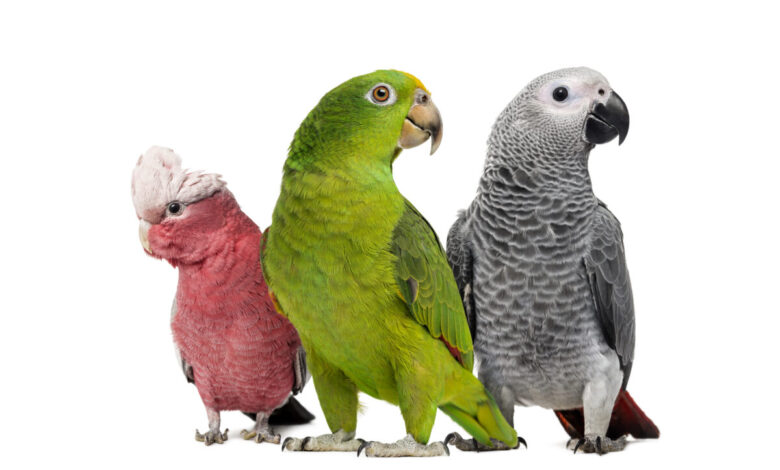Parrots: Nature’s Most Colorful and Intelligent Birds

Parrots are among the most fascinating creatures on Earth. With their dazzling feathers, charming personalities, and impressive mimicry skills, they’ve won the hearts of bird lovers and pet owners alike. But there’s much more to parrots than meets the eye. In this article, we’ll explore everything from their natural habitats to their communication skills, and why parrots are both a joy and a responsibility to care for.
1. The Amazing World of Parrots
It the order Psittaciformes, which includes over 400 species ranging from tiny budgerigars to large macaws. They are mostly found in tropical and subtropical regions like South America, Australia, and parts of Africa and Asia. Their bright plumage is often what grabs attention first, but their behavior and intelligence are what truly make them remarkable.
They are social creatures that live in flocks in the wild. This natural tendency to interact is one reason they thrive in human environments when given enough stimulation and care. They use loud calls, postures, and facial expressions to communicate with each other and their human companions. They’re not just pretty faces—they’re complex animals with high emotional intelligence.
Interestingly, many species of parrots can live extremely long lives. For example, African grey parrots can live 40–60 years, and some macaws can live up to 80! Their long lifespan is one reason why keeping a parrot is such a big commitment. They’re not just pets—they’re lifelong companions.
2. Parrot Intelligence: Smarter Than You Think
They are often compared to toddlers when it comes to their intelligence. In fact, researchers have found that some parrots have cognitive abilities similar to that of a 3–5-year-old human child. They can learn words, recognize shapes and colors, and even understand basic concepts like counting and categorization.
One of the most famous examples is Alex the African Grey, a parrot studied by Dr. Irene Pepperberg for over 30 years. Alex could identify objects, understand concepts like “bigger” and “smaller,” and even answer questions with surprising accuracy. His work changed how scientists view animal intelligence.
But not every parrot is a genius like Alex. Intelligence varies across species and individuals, but in general, parrots are quick learners, capable of developing strong bonds with their owners. This intelligence means they need mental stimulation, such as puzzles, toys, and social interaction, to stay happy and healthy. A bored parrot is an unhappy parrot—and sometimes a destructive one.
3. Parrots and Human Speech: Why They Talk

One of the most iconic traits of parrots is their ability to mimic human speech. But why do parrots talk in the first place? In the wild, They use vocal mimicry to fit into their flock by repeating calls and sounds. When raised by humans, they apply the same mimicry skills to their new “flock”—us!
They don’t understand language in the same way humans do, but they can associate certain sounds with actions, people, or feelings. For example, a parrot might say “hello” when someone enters the room because that’s what it hears often in that context. Some parrots even learn to use words correctly based on context, like asking for a treat or saying “bye” when someone leaves.
However, not all parrots talk. Some species are more vocal than others, and personality plays a big role too. Amazon parrots, African Greys, and budgerigars are known for their impressive vocabularies, while others may prefer squawks and whistles. Training, repetition, and a strong bond with the owner can increase the chances of a parrot picking up words.
4. Parrots as Pets: Joys and Challenges
Keeping a parrot as a pet is a rewarding experience, but it’s not for everyone. These birds require time, attention, and a proper environment to thrive. A parrot needs a spacious cage, a varied diet, regular vet visits, and plenty of toys and interaction. They also need daily out-of-cage time to stretch their wings and explore.
Many first-time bird owners are surprised at how loud parrots can be. Screaming is a natural behavior, especially in the morning and evening when wild parrots are most active. While some of this can be managed through training and routine, potential owners should be prepared for the noise.
Another challenge is their potential to develop behavioral problems like feather plucking, biting, or aggression if their needs aren’t met. These issues often stem from stress, boredom, or lack of social interaction. That’s why understanding the species you’re adopting and committing to their care is crucial.
Despite the challenges, parrots can be deeply affectionate companions. Many enjoy being cuddled, learning tricks, and spending quality time with their owners. They’re emotionally sensitive and can form deep bonds—sometimes even preferring one person in the household over others.
5. Parrot Diet and Health: What They Really Need
A healthy diet is essential for a parrot’s well-being. Unfortunately, many people feed parrots a diet that’s too heavy in seeds, which can lead to obesity and other health problems. A balanced parrot diet includes fresh fruits, vegetables, pellets, and a small number of nuts or seeds as treats.
Different species have different dietary needs. For example, lories and lorikeets require a nectar-based diet, while African Greys benefit from calcium-rich foods like leafy greens. Fresh water should always be available, and food should be rotated to keep the parrot interested and nutritionally balanced.
Regular health checkups are vital since parrots often hide symptoms of illness until it’s too late. Look out for signs like changes in droppings, loss of appetite, lethargy, or feather plucking. Because parrots can live for decades, preventive care is essential to ensure a long, healthy life.
6. Conservation and the Wild Parrot Crisis
Sadly, many wild parrot species are facing extinction due to habitat loss, illegal pet trade, and hunting. Iconic species like the Spix’s Macaw have become extinct in the wild, while others like the Kakapo are critically endangered. Conservation programs are working to protect these birds through breeding efforts and habitat restoration.
The pet trade also contributes to the decline of wild parrots. Although many parrots in captivity today are bred domestically, illegal capture still occurs in some parts of the world. Buying parrots from ethical breeders or adopting from rescue organizations can help reduce the demand for wild-caught birds.
As caretakers of these intelligent birds, it’s important to support conservation by spreading awareness, donating to organizations, or even volunteering. Wild parrots play important roles in their ecosystems, such as seed dispersal, and their loss would create a ripple effect through nature.
Conclusion: Why Parrots Are Truly Special
Parrots aren’t just colorful birds—they’re emotional, intelligent, and full of personality. Whether you admire them in the wild or keep one as a companion, there’s no denying their charm and complexity. But they also come with responsibilities that go far beyond a typical pet. From diet and socialization to enrichment and healthcare, owning a parrot is a long-term commitment.
Understanding parrots means appreciating their wild roots, their advanced intelligence, and their unique way of bonding with humans. If you’re ready for the challenge, a parrot might just become the most fascinating friend you’ll ever have.
YOU MAY ALSO READ
Parrots



